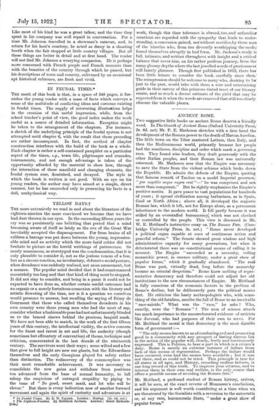ANCIENT ROM.
Two suggestive little books on ancient Rome deserve a friendly word. In The Growth of Ancient Rome (Oxford University Press; 2s. 6d. net) Mr. P. E. Matheson sketches with a firm hand the development of the Roman power to the death of Marcus Aurelius. The little town on the Tibor mastered Latium, then Italy, and then the Mediterranean world, primarily because her people had the manliness, discipline and order which mark a governing race. They found wise leaders, they dealt generously with the other Italian peoples, and their Roman law was universally esteemed. Mr. Matheson sees that the Empire was necessary.
to save the State from the violent schisms which broke down the Republic. Ho admits the defects of the Empire, quoting
that famous remark of Tacitus on a model Imperial governor,' " par negotiis neque supra erat"—" he was competent and not
more than competent." But ho rightly emphasizes the Empire's positive merits. It gave peace to vast populations for hundreds of years ; it spread civilization among barbarians, as in Spain, Gaul or North Africa ; above all, it developed the majestic Roman law, which it left, not for Europe alone, as a permanent inheritance to the modern world. It fell partly because it was stifled by an overstaffed bureaucracy; which was not checked
or controlled by the people. This view is discussed in Mr.' W. E. Heitland's instructive essay on The Roman Fate. (Cam-' bridge University Press, 3s. not.) " Rome never developed
a political organ capable at once of continuous action and peaceful reform." The Senate showed great wisdom and high' administrative capacity for many generations, but when it deteriorated there was no constitutional means of calling it to account. The Empire " succeeded as a necessity, veiling monarchic power, in essence military, under a great show of popular forms," which it gradually abandoned. " The real Rome was past, virtually dead, long before the monarchy became an oriental despotism." Rome knew nothing of repre-' sentative democracy and therefore could not adjust her old institutions to the new circumstances of Empire. Mr. Heitland is fully conscious of the economic factors in the problem of Rome's decline, but he deliberately puts the political causes first. He criticizes the hasty anthropologists who, with some-
thing of the old fatalism, ascribe the.fall of Rome to an inevitable " race-suicide." What was the " race," he asks ? Who, exactly, were the " Romans " ? Tho men of science attach' too much importance to the uncorroborated evidence of satirists like Juvenal, who had purposes of their own to serve. For Mr. Heitland the moral is that democracy is the most dvrable. form of government :— " The only means known to us of combating evil and promoting good in a community with any prospect of lasting success lies in the action of the popular will, clearly, freely and continuously expressed. This is Politics, to bear a part in which is a citizen's duty. Rome is merely an extreme instance of failure from lack of this means of regeneration. Perhaps the failure would have occurred, even had the means been available ; but it was not there, and so could not be tried. This principle is true for all states in all ages, and History, recording endless failures, is one long record of this truth. To improve your citizens, and to interest them in their own real welfare, is the only course that offers a possible moans of avoiding the Roman fate."
Mr. Heitland, a profound student of Roman history, arrives, it will be seen, at the exact reverse of Mommsen's conclusions,
and his argument is well worth considering at a time when wa are threatened by the Socialists with a reversion to the autocratic
or, at any rate, bureaucratic State, " under a great show of popular forms."


































 Previous page
Previous page